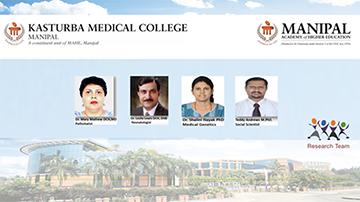India has made incredible progress to reduce newborn mortality, but it still has the highest burden of stillbirths in the world and rates of neonatal deaths remain high.
Dr. Mary Mathew, a Pediatrician and Head of Pathology at Kasturba Medical College in Manipal, was interested in an unusual part about these statistics — that about one-quarter of babies who die in India show signs of injuries to their brain. "No baby should die...We should be able to support any type of eventuality that happens to a baby," said Dr. Mathew. "And so many pre-term and even term infants have signs of neurological insults, or injuries. We wanted to use the MITS technique to see if that could help provide answers as to why."
Starting in February 2020, the MITSBiNS team, led by Dr. Mathew, started their work exploring whether MITS could identify cause of death among stillbirths and neonatal deaths with brain injuries. The MITS Surveillance Alliance awarded an incentive grant to MITSBiNS, providing material support for the project's implementation to ensure the team can carry out the study as effectively as possible.
With the onset of COVID-19 and waves of lockdowns and disruptions, the team overcame immense obstacles to reach their goal of conducting 50 MITS procedures. Initial findings indicate that MITS indeed seems to be a feasible technique for brain biopsies, potentially avoiding the need for a full autopsy by providing a wide variety of information on the types of neurological lesions that contributed to cause of death.
"What started out as a research curiosity has now become something so much more," said Dr. Mathew. "We can save more babies if we can understand causes of injuries to the brain and then help inform interventions and care that avoid these injuries." For example, initial findings indicate that sepsis, a life-threatening illness caused by the body's response to an infection, may be contributing to neurological injuries in both preterm and term infants.
"I think health officials, doctors, and nurses would be surprised at what the research indicates about high rates of septic infection among stillbirths and neonates," said Dr. Mathew. "Findings like this one that could have a huge impact because then we would know that by improving hand hygiene and other sanitation measures in the NICU we could save lives."
Dr. Mathew is a rarity in her field — a combination of both pathologist and pediatrician.
"Pediatric pathology in India is a small field. There are maybe 15 others, and we all know each other by name," said Mathew. "There is hope for more research, but there is a lack of funding in pathology in general. But pathology is one of the basic things that we need to invest more in. If you need to treat a disease, you need to first understand the pathology."
Project Name
Validity of minimally invasive tissue sampling in determining the cause of death in stillbirths and neonates due to neurological insults in the brain: A study in a tertiary care center in India
Location
Manipal, India
Team Members
Mary Mathew, Leslie Lewis, Shalini Nayak, Teddy Andrews, Muralidhar Pai, and Athira Sreenivas; Manipal Academy of Higher Education/Kasturba Medical College
